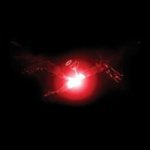
El-P I'll Sleep When You're Dead
(Definitive Jux)
El-P's first solo long player, Fantastic Damage, was a masterpiece of dystopian, sci-fi, modern hip-hop angst in which a hyperwired, junk cluttered future shock mixed imperceptively with a paranoid, enraged vision of the present as an assaulted landscape in which the individual is terrorized and bombarded without relief by corporatism, technology, and corruption. The exact same can be said of his long awaited follow up, I'll Sleep When You're Dead.
The temptation is to criticize an artist for repeating himself, but I think this is missing the point entirely. El-P seems to have reached an artistic state like that of filmmaker David Cronenberg, who also makes very individual works haunted obsessively by the same themes, styles, and motifs over and over to exhausting and exhilarating effect. El-P's albums and Cronenberg's venereal dramedies also share a flair for devising perverse images of the technologic invading, clashing and merging with the flesh, the individual, the soul.
El-P is one of the few emcees whose work brings to mind artists from other mediums as much as fellow rappers. In addition to Cronenberg, the cyberpunk prose of William Gibson and the decayed futuristic identity twisting of Phillip K. Dick are recalled, as well as the cinematic sci-fi touchstones based on Dick's work, Ridley Scott's Blade Runner and Paul Verhoeven's Total Recall. The world of El-P is full of robots and confusing machines, but it seems like now the more it is listened to.
El-P does not have an amazing voice or flow, but he commands what he has with utmost confidence, never faltering as he lets impassioned, detailed verses spill all over. The lyrics are rare in that they would look more amazing than awkward in print, dropping conceits, images, wordplay and invective with the type of profligacy that is worth devising delusions of reference about.
These lyrics are crammed without concern for the idea of stopping atop relentless tracks, packed with layers of hard, abrasive noise that recall the headiest days of the Bomb Squad. I remember when Fantastic Damage came out and I similarly geeked over it, a friend complained that it had "too many lasers." True, this is not easy listening, but the constant pounding has a method in replicating the multi-tiered noise of worlds personal, metropolitan, national and worldwide. Each track drills into the brain with multiple noise devices, from the ceaselessly pounding snares to the non-stop angry swagger of the verses to the DJtastic twists of sound to the layer upon layer of noise, composition and samples. Like vintage Public Enemy, the amped up, dense, shifting, relentless dynamics are headache material, but they cloy in the most positive provocative way, creating a mental state of constant attack and rage that legitimately creates the emotions punk is still trying to achieve through mere petulant volume. The way that these tracks intrigue is like a loud sneering hypnotist with guns, and the more you can become accustomed to the noise, the more rewarded you will be by discovering actually ingenious grooves and symphonies beneath.
Through the madness there is as sane a hope as can be expected. As the title indicates, on I'll Sleep When You're Dead El-P maintains a determination to stay vigilantly aware as long as fuckupedness exists. This is made abundantly clear on Up All Night, which favourably recalls his classic Deep Space 9mm. Tasmanian Pain Coaster proves his sick/awesome credentials by using a "Fire Walk With Me" sample to creepily and sedately open a monstrous track in which he lays down the gauntlet of the future present terrorizing the oblivious mass culture ("this is a sign of what you don't know killing you"). EMG personifies capitalism as sociopath, having a demented b-boy celebration of the slow murder of consumers via bloat and poison. Dear Sirs unrelentingly takes the paranoid schizophrenic scrawlings of city life as apocalypse and chaos over mounting staccato slices of noise and incessant typewriter taps.
The exhausting album ends on one of many highlights. Poisenville Kids No Wins takes the foreboding dark psychedelia of 90s Tricky and does something Tricky never managed to do with it despite his best attempts: he marries it harmonious to grimy NYC hip hop.
Buried somewhere in all this are contributions from Cat Power, The Mars Volta, Cage, and Trent Reznor. It is a tribute to El-P's distinctiveness that the guests are not conspicuous, and everything is mired deep in his own aesthetic. I'll Sleep When You're Dead is a triumph that will, like its predecessor, take years to unpeel. El-P is one of the most uncompromising, excessive, passionate, progressive, ambitious, and noisy producers working, yet his beats pack more of a classic boom bap than artists who claim to love hip hop so much they rap about it almost exclusively. As a lyricist, El P has much more on his mind, painting nothing less than a phantasmagoria of the oppression, assault, and confusion of the modern world "where everything has a meaning but none of it makes sense."
22 March, 2007 - 12:26 — George Booker